Best of #econtwitter - Week of March 26, 2023: interesting tweets
Mar 27, 2023
Welcome readers old and new to this week’s edition of Best of Econtwitter. Please submit suggestions — very much including your own work! — over email or on Twitter @just_economics.
Interesting discussions

Gopi Shah Goda@ipogadog
Citations are often "currency" for academics. While not perfect, they provide a meaningful measure of academic impact, are easy to obtain, and heavily influence academic promotions.
But how do we measure the broader impact of scholarly work? Some thoughts…
1/
10:51 PM · Mar 23, 2023
6 Reposts · 46 Likes

Heidi L. Williams@heidilwilliams_
@MichaelEddy @ipogadog This is a great paper, but to give credit to a key source of the underlying data they use let me add a cite to @overtonio:
overton.io
Homepage - Overton

4:58 PM · Mar 24, 2023
4 Likes

Max Ghenis@MaxGhenis
Friends, colleagues, may I present to you: the California Marginal Tax Rate Schedule

3:13 AM · Mar 21, 2023
232 Reposts · 2.28K Likes

Max Ghenis@MaxGhenis
@StatisticsFTW Yes, though we model TANF in California and not those states (for now--we're working on it in NY and TX). That explains California's increase and spike at the low end.
CA policyengine.org/us/household?f…
TX policyengine.org/us/household?f…
FL policyengine.org/us/household?f…
NY policyengine.org/us/household?f…
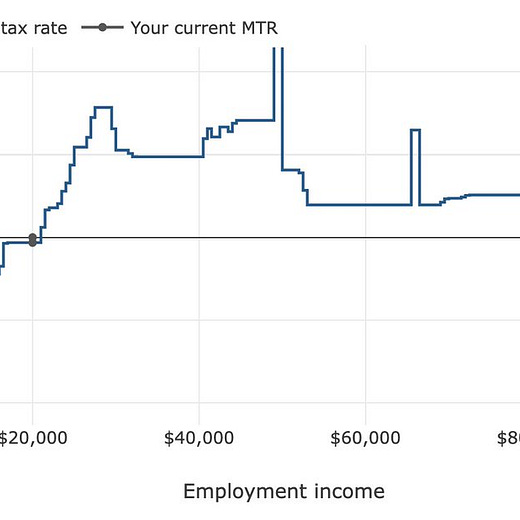
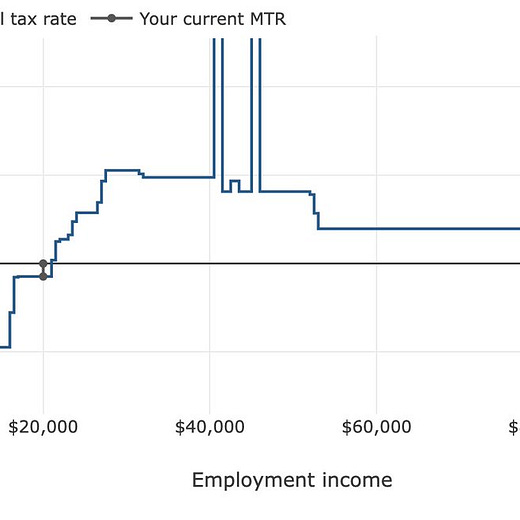
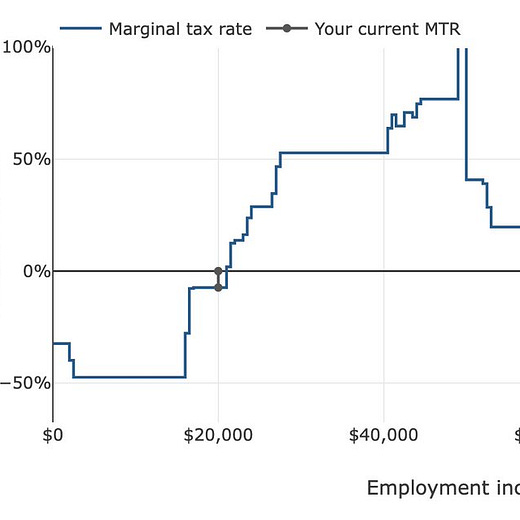
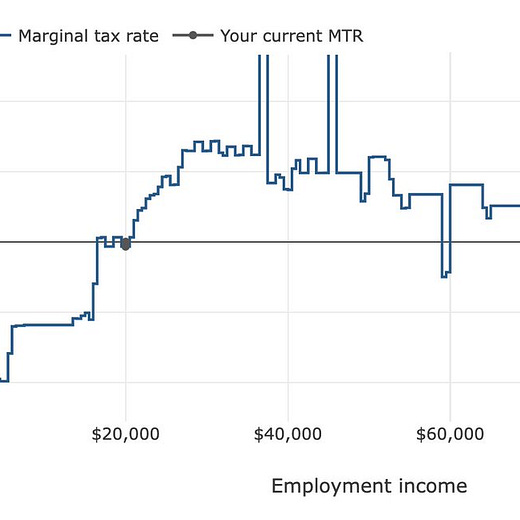
4:51 AM · Mar 21, 2023
3 Reposts · 73 Likes
^🤢

Max Ghenis@MaxGhenis
If this single parent of two in California earns $10k, they take home $38k. If they earn $50k, they take home $49k.
That's a 73% marginal tax rate over a $40,000 earnings range. And that's without childcare and housing subsidies!

3:13 AM · Mar 21, 2023
48 Reposts · 499 Likes

Itai Sher@itaisher
When I teach preference relations, one thing I always emphasize is the difference between indifference and incomparability, that is, between not not caring and being unable to decide.
It’s a very important distinction.
6:44 PM · Mar 26, 2023
2 Reposts · 66 Likes
^file under: completeness axiom is overrated

Taylor John Wright@taylor_wright
I really like John's adaptation and I try to set goals like "write an article that is good enough to be published in X journal" rather than "publish this article in journal X". Your paper's quality is something you control (for the most part) whereas

John Horton @johnjhorton
I debate tweeting this, but I do feel esp. young researchers should know the publication game is a tough one. Lots of noise. Lots of bad opinions masquerading as objective eval. My adaptation is to try to focus on the work and the research and not be so focused on the journal
11:29 AM · Mar 24, 2023
1 Repost · 17 Likes

John Horton@johnjhorton
@StefanFSchubert I also try to put a lot of effort into trying to make results as clear and simple as I possibly can, which I think maximizes long-run impact but I suspect hurts in the short run because it makes what you're doing seem not very impressive
11:08 AM · Mar 24, 2023
23 Likes

Matt Blackwell@matt_blackwell
If I could give a single piece of advice to new PhD students (in poli sci at least): work as hard as you can to write a complete, submittable solo research article by the time you start your 3rd year.
Even if it is never published, the experience you get is insanely helpful
1:20 AM · Mar 26, 2023
67 Reposts · 499 Likes

Dave Jamieson@jamieson
This is demented wsj.com/articles/that-…

2:03 PM · Mar 20, 2023
5.28K Reposts · 18.7K Likes

B.M.@BrettMatsumoto
This article in the WSJ starts by citing the number of job openings in JOLTS, then talks about a bunch of sketchy job listing practices but fails to note that these wouldn't (or at least shouldn't) be counted as job openings in JOLTS:
wsj.com
Job Listings Abound, but Many Are Fake

10:08 PM · Mar 21, 2023
10 Reposts · 42 Likes
AI
Wake up!

Fin Moorhouse@finmoorhouse
In Jan of this year, @bryan_caplan bet @MatthewJBar that no AI would reliably score an A on his economics midterm exams before 2029.
Three *months* later, GPT-4 scores an A.

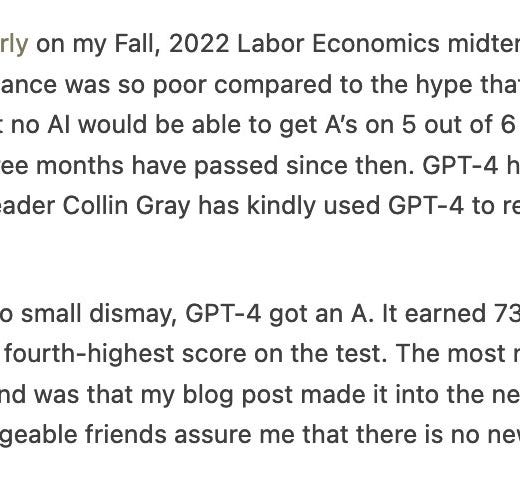
4:49 PM · Mar 21, 2023
81 Reposts · 499 Likes

Ben Levinstein@ben_levinstein
Somehow missed this the first time I looked, but GPT-4 got *significantly worse* at microeconomics after it was trained to tell you what you want to hear.

1:44 PM · Mar 22, 2023
204 Reposts · 1.88K Likes

Jimbo Brand@jamesbrandecon
Today's fun GPT+Econ exercise: asking it to develop example code for structural estimation from a description + latex equations. The goal was to get it to give me a function that could estimate an approximate mixed-logit model. Step 1: ask GPT-4 how best to structure my prompt

7:22 PM · Mar 25, 2023
18 Reposts · 95 Likes

Adam Ozimek@ModeledBehavior
Can’t wait until someone integrates chatGPT with all the census and BLS APIs.
12:21 PM · Mar 25, 2023
4 Reposts · 70 Likes

Ashish Datta@adatta02
@ModeledBehavior Check out
censusgpt.com
Census GPT
12:28 PM · Mar 25, 2023
2 Reposts · 20 Likes

Mushtaq Bilal, PhD@MushtaqBilalPhD
Don't use ChatGPT for academic research. It creates fake citations to papers that don't even exist.
Instead, use Consensus — an AI-powered search engine designed for academics.
Ask it a question and it'll give you a summary of top 5-10 (real) published papers.
8:10 AM · Mar 26, 2023
12.3K Reposts · 57.4K Likes
^haven’t tried this one yet honestly but
Journals and political endorsements

nature@Nature
In 2020, Nature endorsed Joe Biden in the US presidential election. A survey finds that viewing the endorsement did not change people’s views of the candidates, but caused some to lose confidence in Nature and in US scientists generally
go.nature.com
Political endorsements can affect scientific credibility

10:20 PM · Mar 20, 2023
984 Reposts · 5.38K Likes

Ross Douthat@DouthatNYT
Ah, but I see they officially have no regrets:
nature.com
Should Nature endorse political candidates? Yes — when the occasion demands it

1:06 PM · Mar 21, 2023
10 Reposts · 106 Likes

Ben Golub 🇺🇦@ben_golub
This, from the Editor of Science, is so disappointing.
Not because I embrace a naive separation between values and facts.
No: because it's a profound waste of the precious institutions of Nature and Science for them to focus on the same dumb political axis as everyone else.

Holden Thorp, Science EIC @hholdenthorp
In light of @Nature's excellent editorial about why it makes sense to comment on politics (all the way, in their case, to making an endorsement), this is the Pew finding that is most relevant. Following the admonition to stick to science is conceding 1/n https://t.co/1jcwWSsBDs
9:20 PM · Mar 22, 2023
24 Reposts · 261 Likes

Ruxandra Maria 🧬🦭✨@RuxandraTeslo
I don’t think the purpose of academia is to achieve justice. The purpose of academia is to get closer to the truth
Doctors should treat a patient independently of their moral failings (they should cure a murderer); Academics shouldn’t cast moral judgements on their findings
12:18 PM · Dec 12, 2022
76 Reposts · 827 Likes
^could put this tweet in the newsletter every other week

Floyd Zhang@FloydZhang93
I appreciate that @Nature's editorial board responded to my research graciously and promptly. The discussion of my paper offered is thoughtful, but I find the counter-arguments and the conclusion unconvincing. (1/n)🧵

nature @Nature
Editorial: Political endorsements might not always win hearts and minds, but when candidates threaten a retreat from reason, science must speak out https://t.co/tOSdHfFpWe
3:33 AM · Mar 22, 2023
49 Reposts · 206 Likes
AI safety

Jason Abaluck@Jabaluck
What regulatory options make sense to reduce risk from AI? My tentatively preferred option is to allocate at least $100 billion a year or more for rewards and grants for AI safety innovations, assessed by a board of relevant CEOs and AI researchers (i.e. people with inside info).
4:32 PM · Mar 25, 2023
32 Reposts · 192 Likes

Jason Abaluck@Jabaluck
The problems you might have thought would take decades or centuries for AIs to solve are already being solved:

Leopold Aschenbrenner @leopoldasch
Common sense: https://t.co/MUmFV1yo8m
4:32 PM · Mar 25, 2023
19 Likes

Leopold Aschenbrenner@leopoldasch
AI safety becoming mainstream
(Good thread from Yale econ professor)

Jason Abaluck @Jabaluck
What regulatory options make sense to reduce risk from AI? My tentatively preferred option is to allocate at least $100 billion a year or more for rewards and grants for AI safety innovations, assessed by a board of relevant CEOs and AI researchers (i.e. people with inside info).
4:38 PM · Mar 25, 2023
3 Reposts · 66 Likes

Alex Imas@alexoimas
Many are talking about the existential risk of AI, where humanity is “wiped out”.
I think more likely risk is AI used by corporations to supercharge the exploitation human biases, leading to extreme polarization and isolation.
Think Wall-E & Tokyo Ghost, not terminator. 1/4
3:05 PM · Mar 26, 2023
28 Reposts · 152 Likes

Sylvain Catherine@sc_cath
Right, and to some extent, this is a risk that is not specific to AI. Drugs, sugar, alcohol have already destroyed some societies... while other have developed ways to control the dangers of these products and get the best of them.
Same thing here, we need to sort out new norms

Alex Imas @alexoimas
Many are talking about the existential risk of AI, where humanity is “wiped out”.
I think more likely risk is AI used by corporations to supercharge the exploitation human biases, leading to extreme polarization and isolation.
Think Wall-E & Tokyo Ghost, not terminator. 1/4
9:45 PM · Mar 26, 2023
2 Reposts · 9 Likes
Public goods

Moritz Marbach@moritzmarbach
Finding regional / sub-national data in 🇪🇺 is often challenging. I am compiling a list of databases with regional data from statistical agencies across Europe and the corresponding R packages. Please add to this Google Sheet if you know any: docs.google.com/spreadsheets/d…
docs.google.com
Regional Data in Europe | National Databases

3:29 PM · Mar 22, 2023
60 Reposts · 226 Likes
Fin

Ash Jogalekar@curiouswavefn
This recollection of Ed Witten's early career by a friend from his college days is really something. It shows that even geniuses can meander and flounder quite a bit before making a mark.

1:32 AM · Mar 24, 2023
202 Reposts · 980 Likes

Jason Abaluck@Jabaluck
The moral: if you're meandering and floundering, don't worry -- your goal-directed, child prodigy classmates might have been famous physicists in the past, but now they will likely be supplanted by super-intelligent AIs, albeit with an uncertain timeline.
5:23 PM · Mar 24, 2023
8 Likes

Arthur Spirling@arthur_spirling
What’s funny about this is that you can, without needing the labels, immediately tell which line must represent the most popular choice for academics seeking engagement with the world.

6:43 PM · Mar 25, 2023
32 Reposts · 312 Likes
^but:

Alvin Christian@_AlvinChristian
Twitter can be a big time sink and toxic sometimes, but it can also be useful and enriching. For instance, this week I'm going to a conference to present on a paper I wrote inspired by a @johnjhorton tweet!

Alvin Christian @_AlvinChristian
This is really cool.
1) Ppl generally have a good sense of what pre-K/K teachers earn but less so for Elementary/Middle/HS.
2) Ppl really underestimate how much teachers earn - I wonder if some staffing challenges can be addressed by just giving folks more info in HS/college? https://t.co/nov8vEOUxl https://t.co/uJvezczBqg
8:31 PM · Mar 20, 2023
2 Reposts · 46 Likes

Nathan Cofnas@nathancofnas
Out of the 20 most interesting thinkers *under the age of 45*, how many are currently employed by universities?
5:12 PM · Mar 20, 2023
5 Reposts · 18 Likes
^🤔

o||y@ollyrobot
i am outside. it rains, i get soaked. “haha, revealed preferences” i say. i get sick, and lose my job, because i cant work. “revealed preferences”, i murmur, my intellectual might intact. my landlord evicts me, i beg on the street. my sign reads “this is my revealed preference”
11:59 AM · Mar 20, 2023
30 Reposts · 362 Likes
